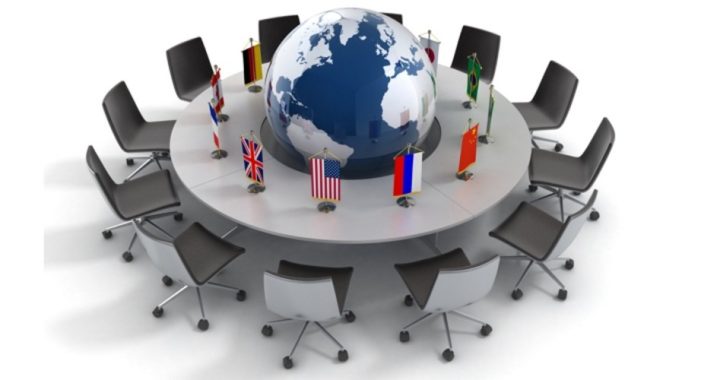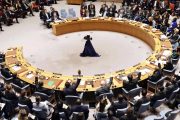
With 2018 now history, we can ask: Who were its biggest losers? Was it Britain with its Brexit bumbling and backtracking; loan-shark, land-grabbing China; a Saudi crown prince pilloried with a public-relations disaster; or carbon-tax coveting French president Emmanuel Macron? Writer Walter Russell Meade mentions all the preceding in a Wall Street Journal opinion piece. But the biggest loser of all, he says, and he just may be correct, is the liberal international order itself.
Making his case, Meade writes:
The biggest loser of 2018 was the post-Cold War system that the U.S. and its closest allies hoped would shape global politics. The idea was that liberal democracy, market-based economic systems and the rule of law would spread from the West into the postcommunist [sic] East as well as into the Global South. International institutions would increasingly replace the anarchic competition of states by developing rules-based approaches to issues from trade to climate change.
Great powers like Russia and China never liked this approach, seeing it as a thinly disguised form of U.S. hegemony and a threat to their illiberal political systems. The aspiration for a liberal world system has faced growing headwinds for many years; in 2018 it buckled further under stress.
Even Japan, long a zealous upholder of the rules-based order, exited the International Whaling Commission; Russia solidified its hold on southeastern Ukraine; China fortified its artificial islands in the South China Sea; the U.S. flouted WTO procedures in pursuit of what the Trump administration calls “fair trade”; and one country after another failed to comply with its commitments under the Paris climate agreement. A modern Voltaire might quip that the old system was neither liberal nor international nor an order, but its absence will be felt if it disintegrates.
Quite true. Whether or not the liberal international order is the biggest 2018 loser, though, it is surely on the wane. Let’s examine one significant aspect of this matter.
Just as WWI was billed as “The War to End All Wars,” our democracy-über-alles foreign policy endeavors have been attended by a certain naiveté on the part of true believers. Consider: Why did we hellp create the monster that is modern China (it got rich on our backs) and embark upon nation-building, assuming that Western-style republics would flower in Muslim lands?
Among those sincere about the Westernization program, these follies were predicated on the notion that not only is our political system universally applicable, but that our “values,” to use that favored term of those who’ve forgotten virtues, would be universally accepted. Of course China would become like us. Why wouldn’t she? But the men who founded Western civilization and, specifically, those forging the United States, were under no such illusions.
For example, President John Adams noted in 1798 that our “Constitution was made only for a moral and religious people. It is wholly inadequate to the government of any other.” Did he have in mind when thus warning, tribalistic Afghanistan where the moral foundation is not the Ten Commandments but Sharia? Can China, if it remains the world’s most atheistic country, make work a system based on the principle of God-given rights?
“Democracy” is not a cure (and our system is a republic, actually), but a system fit for those who have been cured. As to this, if we’d long ago sent missionaries to such nations and could have evangelized them successfully, they might have the foundation of which Adams spoke. Of course, such endeavors are now considered old-fashioned, intolerant, impositional, and paternalistic. No, we’d never seek to impose Christianity.
Just democracy.
We try imposing a system of beliefs — “democratism,” if you will — without even realizing it’s merely the newest evangelization. This isn’t to say evangelization is bad or that our conception of government is ideal or flawed, only that our idealists’ blindness to what they’re actually doing is matched by their blindness to why it’s actually failing.
Evident here is a kind of ideological chauvinism and what leftist moderns once called “ethnocentrism.” Why would everyone else accept our “values”? Because they’re so obviously true? Even if so, man’s history isn’t one of hungry receptiveness to Truth, but moral-corruption-driven resistance to it.
Moreover, most important when evangelizing is providing good witness for one’s faith. How are we doing in this regard? When the world sees people dancing mostly naked in our “Pride” parades, our “gender” agenda and boys in girls’ bathrooms, how we sue ourselves into oblivion, the sewer pipe coming out of Hollywood, and that we can’t even protect our own borders, does it say, “Wow, we really want to be like them!”?
Add to this our hate-America-first-crowd-induced self-flagellation, and the non-Western world just may conclude about us, “What’s to like about them? They don’t even like themselves.”
Lastly, today’s Western leaders rule republics, tout “democracy,” but are nonetheless quite undemocratic. How much are the governments of Britain, France, and Germany respecting the people’s will when forging on ahead with their immigrationist policies despite popular opposition to them?
If the West could have one New Year’s resolution, it should be, before trying to change the world, to change itself. A little more nation-building at home, of the right kind, and we just may not have to fear a future New Year’s headline reading (in Chinese), “The Year’s Biggest Loser Was the West.”
Photo: koya79/iStock/Getty Images Plus



